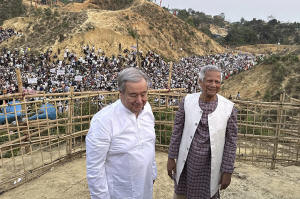UN chief describes aid cuts as 'a crime' during visit to Rohingya
refugee camps in Bangladesh
[March 15, 2025]
By AL-EMRUN GARJON and JULHAS ALAM
COX'S BAZAR, Bangladesh (AP) — U.N. Secretary-General António Guterres
on Friday described humanitarian aid cuts by the United States and
countries in Europe to Bangladesh, where thousands of Rohingya refugees
are located, as "a crime.”
Guterres was on a four-day visit to Bangladesh where he is assessing the
plight of more than 1 million Rohingya refugees from Myanmar whose
future remained uncertain over possible aid cuts soon. Every year, he
chooses a Muslim country to visit during the holy month of Ramadan.
He said that Bangladesh's southern coastal district of Cox's Bazar,
where most of the Rohingya have been sheltered, is “ground zero for the
impact of the budget cuts on people in desperate need.”
Hundreds of thousands of Rohingya, including more than 700,000 who
arrived in 2017, have lived in Bangladesh for decades. About 70,000
others crossed the border from Myanmar in 2024 when, during fighting
with the military junta, the opposition force known as the Arakan Army
effectively took over the Rakhine state where Rohingya were displaced.
The U.N. will do everything possible to arrange adequate funding for the
Rohingya refugees after the recent announcement of dramatic aid cuts by
the U.S. and other countries in Europe, Guterres said. The U.N.'s food
agency recently said it would have no option but to cut food aid by half
for the Rohingya starting next month if they fail to arrange adequate
funds to feed them.
In a meeting with Bangladesh’s interim leader, Nobel Peace Prize
laureate Muhammad Yunus in the capital, Dhaka, Guterres expressed his
concern over Western nations’ decision to boost defense spending while
humanitarian aid is squeezed across the world.
”(Aid) cuts are a crime,” the U.N. chief was quoted as telling Yunus by
the state-run Bangladesh Sangbad Sangstha agency during Friday’s
meeting.
Worries surfaced in recent weeks in dozens of camps for Rohingya
refugees in Bangladesh’s southern coastal district of Cox’s Bazar and
elsewhere over fears of aid cuts following Washington’s decision to
close operations. A large portion of the millions of dollars needed for
supporting Rohingya refugees in Bangladesh had come from the U.S. Agency
for International Development, or USAID.

Bangladesh had said the halt of international aid money would stop other
projects in the country but that funding for Rohingya refugees would
continue to flow.
A letter from the U.N.'s World Food Program earlier this month said cuts
to food rations could take effect starting next month at Cox’s Bazar,
home to dozens of camps housing Rohingya refugees. The WFP said the food
rations could be reduced to $6, from the current $12.50 per month,
unless adequate funding is secured.
WFP spokesperson Kun Li said recently if the WFP is unable to secure
sufficient funding — $81 million to sustain operations through the end
of the year, including $15 million needed for April — it will have to
reduce rations starting next month.
The interim government in Bangladesh hopes the visit will boost
international efforts to mobilize aid for the Rohingya refugees and
attract new global attention to their crisis.
[to top of second column]
|

U.N. Secretary-General António Guterres, left, and Bangladesh's
Chief Adviser and Nobel Laureate Professor Muhammad Yunus, stand
together before they broke fast with Rohingya refugees at the Ukhiya
camp in Cox's Bazar, in Bangladesh, Friday, March 14, 2025. (AP
Photo/Mahmud Hossain Opu)

‘A feeling of frustration’
Yunus, who came to power in August after former Prime Minister
Sheikh Hasina was ousted from office in a mass uprising, used his
meeting with Guterres to seek U.N. support for the dignified return
of the Rohingya to their homeland in the western Rakhine state in
Myanmar. He also asked Guterres to mobilize adequate food and
humanitarian assistance for the refugees.
“We are trying to raise attention of the plight of the Rohingya
people. The world should know how they are suffering. There is a
feeling of frustration,” Yunus was quoted as saying.
Guterres and Yunus left Dhaka to visit camps in Cox’s Bazar district
where the leaders met with refugees and learned about their plights.
In a media briefing later Friday, Guterres said he will call on the
international community to give urgent support to the refugees.
“We cannot accept that the international community forgets about the
Rohingya,” he said. “I will be reaching out to all countries that
can support us to ensure that sufficient funds are made available,
so people do not suffer even more — or, in some cases, lose their
lives."
Repatriation is ultimate solution
Guterres said that Rohingya refugees “want to go home — Myanmar is
their homeland.”
“My message to all parties in Myanmar is clear: exercise maximum
restraint, prioritize the protection of civilians in accordance with
international humanitarian law, and prevent further incitement of
communal tension and violence — paving the way for democracy to take
root and to create conditions for Rohingya to be able to go back
home as they all want," he said.
The U.S. has been the top donor to Bangladesh for Rohingya refugees,
providing the U.N. with emergency food and nutrition assistance. The
U.S. usually provides almost half of the aid money spent on the
humanitarian response to Rohingya refugees in Bangladesh, which
amounted to about $300 million in 2024.
Bangladesh says repatriation of the refugees to Myanmar is the
ultimate solution. The Buddhist-majority Myanmar has been accused in
an international court of genocide against Rohingya. Complexities
over verification and other diplomatic and political issues have
made the future of the refugees bleak.
___
Alam reported from Dhaka, Bangladesh. Associated Press writer Edith
M. Lederer at the United Nations contributed.
All contents © copyright 2025 Associated Press. All rights reserved |